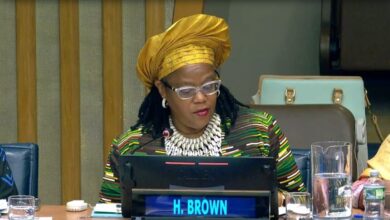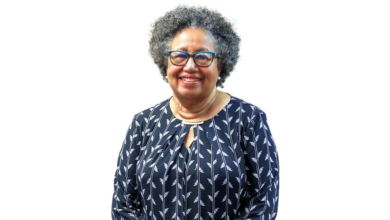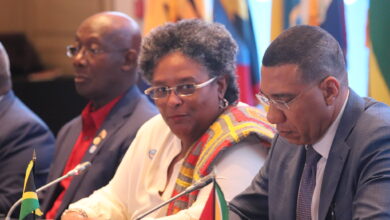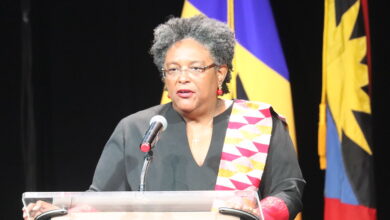We are not begging! That’s the word from Programme Manager, Culture and Community Development at the CARICOM Secretariat Dr. Hilary Brown in her remarks at a Reparations Rally held at the Derek Walcott Square in Castries Saint Lucia on Saturday. The event was preceded by a Reparations relay that was anchored by three time Olympian Levern Spencer.
We are not living in the past; we are claiming what is rightly ours that was lost or stolen from us. And most of all what we lost was our right to culture and identity, to loving and appreciating who we are; it was the ideology of racism that we have inherited from centuries of oppression, which denigrates and devalues everything black and everything African, said Dr. Brown
According to Dr. Brown, the CARICOM Reparations Commission sees the persistent racial victimization of the descendants of slavery and genocide as the root cause of their suffering today and sees this history of slavery and colonialism as the primary cause of development failure in the Caribbean. She said this was the reason the Commission has outlined a Caribbean Reparatory Justice Ten Point Action Plan. She said the plan would address the deficiencies inherited from these periods of oppression.
A Ten point Action Plan to address the health and education crisis, the identity and self hatred crisis, the debt crisis, science and technology crisis and the persistent poverty of people of African descent and those of the indigenous people. A Ten point Action Plan to improve our knowledge and appreciation of our heritage and of the African continent and to facilitate repatriation of our people. This is what Reparations is all about.
She said a lot had been done by the Region since independence to address its many development problems, but the Region can go only so far because it is coming from so far behind. She encouraged everyone present to see the current actions being taken as only the beginning of the process of educating the youth on their history, on their rights and on why Reparations is not an option, but an imperative.
We must not be ashamed to claim what is rightfully ours, that was extracted against our will for so many centuries. And this is why the time has come, this is our moment in history; we now have the confidence, the knowledge and the conviction to say without apology: Reparations now! she concluded.
Reparations for the slave era is an issue that has increasingly resonated in recent years and CARICOM, at its highest level of decision-making, has placed this issue on the front burner of its agenda.
A Ten-Point Action Plan for Reparatory Justice was endorsed by Heads of Government in March 2014, and is being used as the basis for discussions on reparations. In 2013, CARICOM Heads of Government established the CARICOM Reparations Commission (CRC). Its mandate is to prepare the case for reparatory justice for the Region’s indigenous and African descendant communities who are victims of Crimes against Humanity (CAH) in the forms of genocide, slavery, slave trading and racial apartheid. Rallies have previously been held in Barbados, Guyana, Suriname and Antigua and Barbuda.






